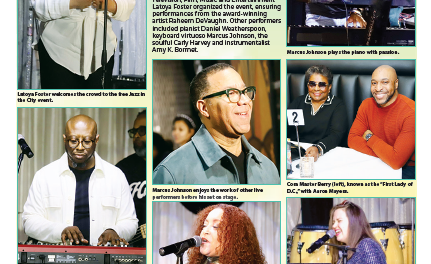By David Mitchell,
Special to the AFRO
Why is it important to have Black people in the theater space?
My gut response: “Why is it important to have White people in the theater space??”
Both questions are provocative. When my counterparts and I were met with the first question, for years I got stuck reaching for a colorful answer. You know… one of those answers steeped in social justice rhetoric and the latest DEI jargon. But that answer never came. Instead, my mind settled on Fonzarelli simplifications like…“Aaayyy, what’s the alternative?” and “How are you defining theater?”
Then the snark took over.
“Did we get disinvited??,” I’d ask in return, “Isn’t everybody Black now?” I’d sarcastically quip.
I jest, but this type of question carried much more weight in my 20s and 30s because the further back in time you go, there were “less” opportunities in the Arts, for people of color, for Black people, for Black men– even the Black men with Al B. Sure and Billy Dee swagger. I’m joking again, but it’s true.
I remember feeling “less than” in the first theater spaces I encountered. I remember being involuntarily cloaked with preconceptions, and always met with candor that was assuming and unintentionally hurtful. Those “getting to know you” phases called for superhuman patience as we all gingerly moved through and around residual biases, left behind from the impact of minstrelsy.
Much to my chagrin, I was periodically hip-checked with the classic Black male stereotypes like “quick to anger,” “overactive libido” and “slow to interpret.” Come to think of it, I spent more time diffusing and invalidating preconceptions and micro aggressions than I care to admit. I certainly remember being frustrated– even angered– by the daily navigation. It got in the way of “the work,” learning and anticipated exploration.
In retrospect, there was a lot of time and energy lost creating a “safe space” for my White counterparts.
On the other hand, I was always welcomed and celebrated as a “Magical Negro” (as my colleague Tracie Jiggetts likes to call us). This was in part due to the infrequency of opportunities.
“Only a few ‘Magical Negroes’ at a time,” has been the unfortunate history of the American theater. So now, re-considering the question: “Is it important to have Black people in the theater space” I say “important and necessary!”
We’ve put too much time into redefining, naming, claiming and eliminating barriers in predominantly White spaces…while watching the resources dwindle in our culturally specific theater spaces. We’re still fighting because systemic injustice, toxic workplace culture and institutional racism are ever present– and in a lot of cases– immovable.
I’m reminded of Sister Nataki Garrett (formerly of Oregon Shakespeare Festival), Sister Hana Sharif, the new artistic director at Arena Stage, Baltimore’s Kenn-Matt Martin, interim artistic director at Center Stage, and Mica Cole, executive director TimeLine Theatre Company. Each of these movers and shakers in the theater realm rank as seasoned executive leaders at the top of the field– yet each can speak to a journey mired in frequent injustices. Each of them can speak of discouraging inequities at predominately White institutions throughout their professional careers. Don’t take my word for it, Google it! It’s a path less traveled and a path not for the faint of heart!
These individuals carry the accessibility torch into spaces that Black and Brown people are still fighting to get into. You might ask, “To what end?” Well, until the field is leveled…BOOM!
The question shouldn’t be is it important for Black people to be in the theater space. It should be a bit more expansive like, “Who the hell is missing?!?!”
American theater is incomplete and lopsided without the inclusion of all voices. Those who choose to exclude Black people– or any other ethnicity– from a theater space are doomed. Period. They should probably hop in their DeLorean and head back to the 1950s, where ethnicity was swept under the rug and everything and everyone marveled at two dimensional interpretations of life.
To my Black thespians, I say the time is now! If you can’t find a theater space to play in, build your own! We’re really good at that here in Charm City!
The post ‘To be, or not to be’: a look at how Black people exist in the theater space appeared first on AFRO American Newspapers .










